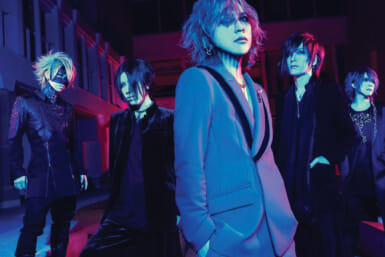Music writer and blogger Ed Cunningham has traveled Japan, following a diverse range of Japanese artists, from Melt Banana and Boredoms to Sheena Ringo. Here’s Ed’s cure for those winter blues – a round-up of a few of the best Japanese albums released in the first month of 2020.
Gezan, ‘Klue’
Jūmitsuki no kabutomushi
Osaka-based Gezan are more than just an “experimental” or “noise rock” band. They’re wild, unhinged, maybe feral. Their latest album, Klue (or, appropriately, Insanity) makes you genuinely worry whether they’re alright. It’s the kind of album that grabs you by the ears and runs rampant; 40 minutes or so of bewildering radical stylistic pendulations, sprawling layers of guitar, nightmarish sound design and vocal bombardment.
There are countless components to Klue that add to one’s general feeling of helplessness about its sheer abnormality. It’s a noise rock record but, at one point or another, it also brings in bits of dub, neo-psychedelia, math rock, post-hardcore and even spoken word and chamber music. Instrumentally, it’s unpredictable to say the least; blisteringly loud but melodic too and always, totally, engrossing.
But the instrumentals only tell half the story. What truly, unsurpassably makes Klue so unhinged are its vocals. Gezan’s vocalist, Mahi the People, sings either in an odd, left-of-field croon or with demented pace. He growls, squeals and screams; and often underlays tracks with rapid, nonsensical chants that serve as a kind of percussion. His lyrics, meanwhile, are potent and political; furious and apparently anti-nearly-everything.
At time of writing, Klue has only been out a few days. Even so, it seems special. And such a record, that panders to no one and thrives fully in a world of its own, is difficult to see in any other light.
OOIOO, ‘Nijimusi’
Thrill Jockey
The new OOIOO record does exactly what one would hope of such a legendary and celebrated experimental outfit. Their first in six years, Nijimusi hails all the little elements of OOIOO’s past sound, from atonal electronic noise to psych-rock jams and freeform drumming, that have ensured their stature as royalty among fans of contemporary experimental music. Its guitars bleed with a squelching drip, YoshimiO wails in typically ailing fashion, and quiet and noise are weighted meticulously against each other.
Even if, at times, some may find Nijimusi too abrasive or formless, it’s never boring or indulgent. Every track has little niches of conventionality, whether it be the steadiness of the drumming on the likes of “Jibun” or funky bass on “Kawasemi Ah” that pins the rest of their sound together. Nijimusi is easily one of OOIOO’s strongest releases, a welcome return that shows YoshimiO’s wildness is anything but mellowing and that this outfit, once considered but a side-project of Boredoms, is surely soon to be considered equal.
Tricot, ‘Makkuro’
Cutting Edge
Makkuro is Tricot’s first major gear-change since their debut. After A N D, which struggled due to multiple drummers and 3, an impressive but unexciting return to form, Makkuro attempts some broader and more consistent stylistic tweaks. Hiromi Hirohiro’s bass is more prominent than ever before, while there’s a richness to the guitars throughout that add more of a pop sheen.
That isn’t to say Makkuro goes so far as to loss contact with what made Tricot so commended in the first place. It’s within touching distance of their original sound to the extent that, on the surface, it might even seem like more of the same. Though one gets the impression that Makkuro is somewhat comfortable for Tricot, it’s different enough to be rewarding and nevertheless is their most consistent project since their debut.
Ujico*, ‘Ayakashi’
Cachettenotes
Ayakashi attempts to make wonky – a type of electronic music with hip hop influences and an instable mid-range – with bits of folk music. Ujico*, born Keitaro Ujiie and also known as Snail’s House, intersperses flute among densely-constructed electronic beats and gleaming synthesisers in a way that sounds like the work of few others. It can occasionally sound slightly gimmicky, but the attention to detail and overarching concept behind Ayakashi deserves recognition.
Fulusu, ‘The Nativity’
Self-Released
The Nativity is most impactful when it crams throttling, rumbling bass into short bursts walled by weighty, distorted guitars. Short but poignant, it amounts to Fulusu’s heaviest, most intense release so far and, while it may only be an EP, it’s as long as one would want from something that barely gives its listener space to breathe.
Despite being a relatively radical departure from the melodic math rock sound explored only on last year’s record The Voice Between Us, Fulusu’s typically tight performances tie The Nativity together and ensure a more steady and explosive start to the new decade.
Feature image by DisobeyArt / Shutterstock.com









